从句和非谓语动词的转化
非谓语动词和从句的转换

II. V-ed形式与从句之间的转换
1. v-ed形式作定语可换成定语从句
The question discussed yesterday is very important.
The question that / which was discussed yesterday is very important.
非
非
谓
谓
语
语
动
动
词
词
与
与
从
从
句
句
间
间
的
的
转
转
换
换
一、什么叫做非谓语动词
在英语中,动词按其在句子中的作用,可分为: 谓语动词和非谓语动词。 谓语动词就是可以单独直接在句子中做谓语的动词。 非谓语动词就是不能单独在句子中做谓语的动词。
二、非谓语动词的表现形式有:
不定式 (to do) 现在分词 (doing) 过去分词 (done) 动名词 (doing)
1. 时间状语:可改为时间状语从句,也可在分词前加上 连词“when , while , until”等,使其时间意义更 明确。(多置于句首,也可置于句末)
2. 原因状语:可改为原因状语从句或并列结构。(多置于 句首或句末,也可置于句中)
3. 条件状语:可加连词if , unless 等;也可换成条件 状语从句。(多置于句首)
Tom's knowing English helps him in learning French.
That Tom knows English helps him in learning English Her being out of work was unexpected.
(完整版)从句与非谓语之间的转换
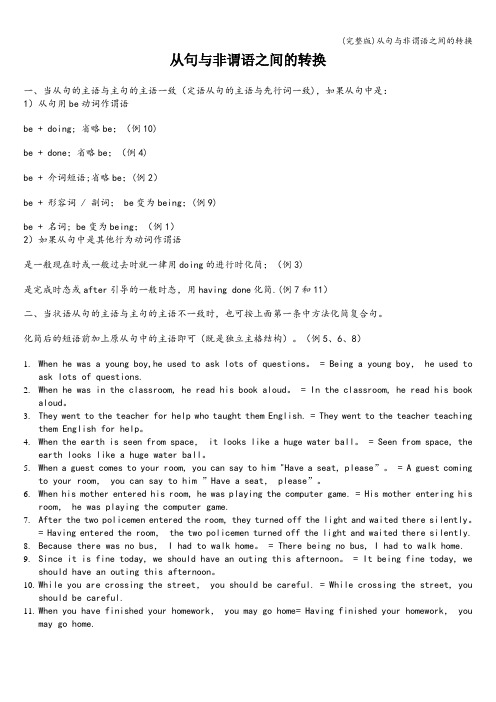
从句与非谓语之间的转换一、当从句的主语与主句的主语一致(定语从句的主语与先行词一致),如果从句中是:1)从句用be动词作谓语be + doing; 省略be;(例10)be + done;省略be;(例4)be + 介词短语;省略be;(例2)be + 形容词 / 副词; be变为being;(例9)be + 名词; be变为being;(例1)2)如果从句中是其他行为动词作谓语是一般现在时或一般过去时就一律用doing的进行时化简;(例3)是完成时态或after引导的一般时态,用having done化简.(例7和11)二、当状语从句的主语与主句的主语不一致时,也可按上面第一条中方法化简复合句。
化简后的短语前加上原从句中的主语即可(既是独立主格结构)。
(例5、6、8)1.When he was a young boy,he used to ask lots of questions。
= Being a young boy, he used toask lots of questions.2.When he was in the classroom, he read his book aloud。
= In the classroom, he read his bookaloud。
3.They went to the teacher for help who taught them English. = They went to the teacher teachingthem English for help。
4.When the earth is seen from space, it looks like a huge water ball。
= Seen from space, theearth looks like a huge water ball。
5.When a guest comes to your room, you can say to him "H ave a seat, please”。
从句与非谓语动词之间的转换

从句与非谓语动词之间的转换非谓语动词和从句可以相互转换,那么如何将复合句改为简单句呢?首先,需要分清主从复合句,然后取消从句,一般要把引导从句的连词去掉。
例如,将"When he was waiting for the bus。
he saw a dog"改为"Waiting for the bus。
he saw a dog"。
其次,如果从句的谓语动词是主动式,就要把谓语动词改为现在分词;如果从句的谓语动词是被动式,就要把谓语动词改为过去分词,并且要注意时态的变化。
例如,将"After he had finished his homework。
he went home"改为"Having finished his homework。
he went home"。
另外,使用分词短语作状语时,它逻辑上的主语必须与句子的主语一致。
如果主从句的主语不一致,在取消掉从句变为-ing或-ed形式时,要把从句的主语保留,其它部分和以前的改法一样。
例如,将"As it was hot。
we went swimming"改为"It being hot。
we went swimming"。
需要注意的是,在使用分词短语作状语时,它也可以有自己独立的逻辑上的主语,这种结构称为独立主格结构。
在很多情况下,它都表示一种伴随的动作或表示一种原因。
例如:1.If the weather allows。
I will go there.2.After the rain ped。
XXX.3.His XXX。
and he prepared to return to his institute.4.With so many comrades absent。
XXX.From the above examples。
we can see that the present participle (-ing) usually indicates an n that is happening at the same time as the main verb in the sentence。
(完整word版)非谓语动词和从句的转换
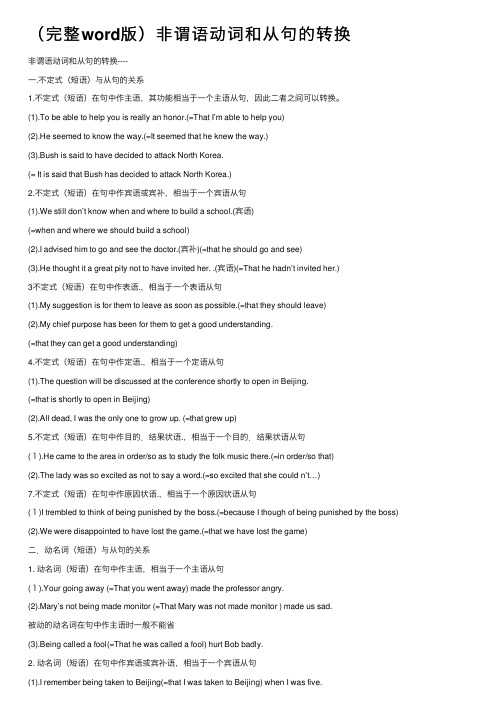
(完整word版)⾮谓语动词和从句的转换⾮谓语动词和从句的转换----⼀.不定式(短语)与从句的关系1.不定式(短语)在句中作主语,其功能相当于⼀个主语从句,因此⼆者之间可以转换。
(1).To be able to help you is really an honor.(=That I’m able to help you)(2).He seemed to know the way.(=It seemed that he knew the way.)(3).Bush is said to have decided to attack North Korea.(= It is said that Bush has decided to attack North Korea.)2.不定式(短语)在句中作宾语或宾补,相当于⼀个宾语从句(1).We still don’t know when and where to build a school.(宾语)(=when and where we should build a school)(2).I advised him to go and see the doctor.(宾补)(=that he should go and see)(3).He thought it a great pity not to have invited her. .(宾语)(=That he hadn’t invited her.)3不定式(短语)在句中作表语.,相当于⼀个表语从句(1).My suggestion is for them to leave as soon as possible.(=that they should leave)(2).My chief purpose has been for them to get a good understanding.(=that they can get a good understanding)4.不定式(短语)在句中作定语.,相当于⼀个定语从句(1).The question will be discussed at the conference shortly to open in Beijing.(=that is shortly to open in Beijing)(2).All dead, I was the only one to grow up. (=that grew up)5.不定式(短语)在句中作⽬的.结果状语.,相当于⼀个⽬的.结果状语从句(1).He came to the area in order/so as to study the folk music there.(=in order/so that)(2).The lady was so excited as not to say a word.(=so excited that she could n’t…)7.不定式(短语)在句中作原因状语.,相当于⼀个原因状语从句(1)I trembled to think of being punished by the boss.(=because I though of being punished by the boss) (2).We were disappointed to have lost the game.(=that we have lost the game)⼆.动名词(短语)与从句的关系1. 动名词(短语)在句中作主语,相当于⼀个主语从句(1).Your going away (=That you went away) made the professor angry.(2).Mary’s not being made monitor (=That Mary was not made monitor ) made us sad.被动的动名词在句中作主语时⼀般不能省(3).Being called a fool(=That he was called a fool) hurt Bob badly.2. 动名词(短语)在句中作宾语或宾补语,相当于⼀个宾语从句(1).I remember being taken to Beijing(=that I was taken to Beijing) when I was five.(2).He admitted having married Mary to a soldier(=that he had married Mary to a soldier).3.动名词(短语)在句中作表语.,相当于⼀个表语从句(1).My duty is serving the people heart and soul (that I’ll serve the people heart and soul).(2).The problem is his not having prepared his lessons for the exam(=that he hasn’t prepared his lessons for the exam)(3).The difficulty is Mary’s being caught between the two trees(=that Mary is caught between the two trees).4.介词+动名词(短语),相当于⼀个从句(宾语从句或同位语从句 0(1)He was afraid of being scolded by his mistake.(=that he was…)(2).He was astonished at her knowing you.(=that she knew you)(3).We heard the news of our team having won.(=that our team had won)三.分词(短语)与从句的关系1.分词(短语)作定语,相当于⼀个定语从句(1)The hospital was an old building built in 1931(=that was built in 1931).(2).Do you know the girl standing over there(=who is standing over there)?(3).The man speaking to us the other day(= who spoke to us the other day) has gone to Japan.本节值得注意的问题:现在分词短语作定语时,所表⽰的动作不能先于谓语所表⽰的动作,也不可以表⽰将来。
非谓语动词与从句的转化简化(课堂PPT)

5. v-ing形式作状语可换成相应状语从句
1)On arriving =as soon as I arrive
there ,I will telephone you(时间).
2)(while) waiting for the bus, I caught sight of her(时间).
疑问句 1.简单句 祈使句
句
感叹句
表语从句
子 的 2.并列句
主语从句
分
名词性 宾语从句
类
从句
同位语从句 <=>非谓
3.主从复合句 定语从句
语动词
状语从句
非谓语动词与从句间的相互关系及转换:英语中的 非谓语动词是整个英语语法当中非常重要的部分, 也是英语学习的一个难点。非谓语动词作句子成分 时与相应的从句有着千丝万缕的联系,它们之间可 以有条件的进行相互转换。
your advice. =that I haven’t accept 2)He suggests us making better
use of the school library. =that we (should) make better
3)He found the street lined
=that the street was lined
=while I was waiting
3)Educated by the Party, he became =As he was a great fighter(原因). educated
4) Not having =Because I hadn’t
received an answer, I wrote again.(原因).
定语从句与非谓语动词的转换

定语从句和非谓语动词是高中阶段重要的两大语法项目。
定语从句的应用可以使语言表达更精确更生动,显得使用者具有较高的英语文化底蕴,但也是中学英语的难点语法项目,许多同学在学习和运用定语从句时,感到很难理解。
若将其简化,理解起来就比较简单了。
而非谓语动词的正确使用,就可以使定语从句的理解容易化,简单化,而且使语句简练、更有文采。
掌握二者的转换,有助于我们更好的理解其用法,并能够自如地运用。
下面我就着重谈谈如何将定语从句转换成非谓语动词以及转换时应注意的事项。
1定语从句转换成不定式“to do”。
定语从句的谓语动词是将来时或含有情态动词或含有序数词the next,the last等时,该定语从句转换为不定式“to do”.(1)The plane which will arrive is from Hubei.→The plane to arrive is from Hubei。
(2)The students will go to a party that will be held in our class at 7:45.→The students will go to a p arty to be held in our class at 7:45.(3)He was the first boy who came to school.→He was the first boy to come to school..2定语从句可转换成为“介词+关系代词或副词+不定式”。
“介词+关系代词”引导的定语从句和“介词+关系代词或副词+不定式”充当的定语,可以相互转换。
被这种定语修饰的名词往往在逻辑上充当不定式动作的地点、时间或工具。
例:(1)She wanted a room in which she could do her homework.→She wanted a room in which to do her homework.(2)She had only a pen with which she can write.→She had only a pen to write with.或She had only a pen with which to write.注:定语从句转换成“介词+ 关系代词+不定式”时,此时的不定式一定是及物动词,如是不及物动词,则需在动词后面加上相应的介词。
(完整版)定语从句和非谓语做定语的转换

定语从句和非谓语做定语的转换非谓语做定语是定语从句的简化形式Please replace the underlined part with relative clauses1.The picture hanging on the wall is painted by my nephew.2.The Olympic Games, held in 776 B。
C。
, did not include women players until 1912.3. The first text books written for teaching English as a foreign language came out in the 16thcentury。
4.Are you going to attend the meeting to be held tomorrow?5. a developed/developing country6. He is a student loved by all the teachers.7.The building being built will be the third Teaching Building of our school。
8.She is always the first (one) to come and the last to leave.9.Let's first find a room to live in / to put the things in.10.We have nothing to worry about。
11.I have a lot of things to do today。
12.Have you got anything to say at the meeting?总结:现在分词做定语从时态上表示_______ 或_________ 从语态上表示________;若表示被动; 可以用_______过去分词做定语从时态上表示_____或______ 从语态上表示____________不定式做定语从时态上表示__________ 从逻辑上可以表示动词和先行词之间的_______ 同时要注意加上相应的介词,若先行词被________________________所以修饰,定语从句部分可以用不定式替代Replace the underlined part with ing/ ed / to do1。
非谓语动词和从句的转换优秀课件

一、什么叫做非谓语动词
在英语中,动词按其在句子中的作用,可分为: 谓语动词和非谓语动词。 谓语动词就是可以单独直接在句子中做谓语的动词。 非谓语动词就是不能单独在句子中做谓语的动词。
二、非谓语动词的表现形式有:
不定式 (to do) 现在分词 (doing) 过去分词 (done) 动名词 (doing)
1. 时间状语:可改为时间状语从句,也可在分词前加上 连词“when , while , until”等,使其时间意义更 明确。(多置于句首,也可置于句末)
2. 原因状语:可改为原因状语从句或并列结构。(多置于 句首或句末,也可置于句中)
3. 条件状语:可加连词if , unless 等;也可换成条件 状语从句。(多置于句首)
If we weIrfegGgiivviveeennn more time , we could do it much better .
He was Wwarned of the danger, bhuet he still went skating on the ice.
但是,有些分词作状语是独立结构,不与句子的主语 产生联系;常见的有:judging from, generally
While waiting at the dentist’s, I read the whole of a short story. (=While I was waiting … ) Before being in the army, he was an engineer.
(= Before he was in the army, …) __H_av_in_g__fi_ni_sh_e_d__(finish) my work, I went to
状语从句与非谓语动词的转化(写作)
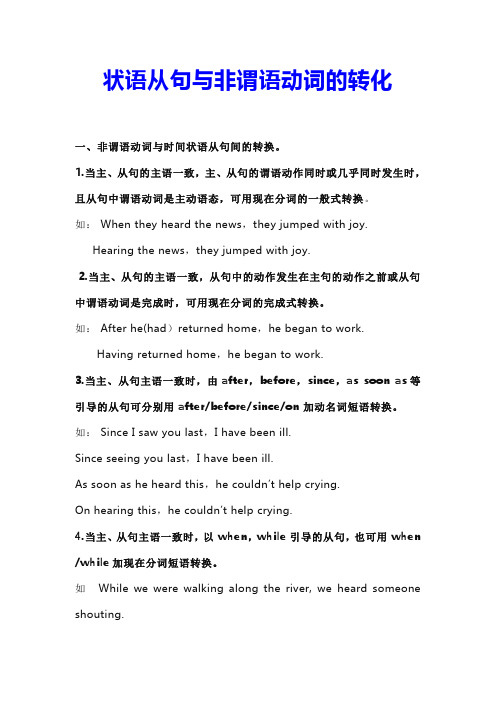
状语从句与非谓语动词的转化一、非谓语动词与时间状语从句间的转换。
1.当主、从句的主语一致,主、从句的谓语动作同时或几乎同时发生时,且从句中谓语动词是主动语态,可用现在分词的一般式转换。
如: When they heard the news,they jumped with joy.Hearing the news,they jumped with joy.2.当主、从句的主语一致,从句中的动作发生在主句的动作之前或从句中谓语动词是完成时,可用现在分词的完成式转换。
如: After he(had)returned home,he began to work.Having returned home,he began to work.3.当主、从句主语一致时,由after,before,since,as soon as等引导的从句可分别用after/before/since/on加动名词短语转换。
如: Since I saw you last,I have been ill.Since seeing you last,I have been ill.As soon as he heard this,he couldn’t help crying.On hearing this,he couldn’t help crying.4.当主、从句主语一致时,以when,while引导的从句,也可用when /while加现在分词短语转换。
如While we were walking along the river, we heard someone shouting.While walking along the river,we heard some one shouting.5.当主、从句的主语一致,且从句的谓语动词是被动语态时,可用过去分词短语转换。
如:After they were sent to the zoo, the monkeys had good health. Sent to the zoo, the monkeys had good health.6.当主、从句的主语不一致时,时间状语从句可转换成分词的独立主格结构,即名词/主格代词+分词。
原题目: 状语从句与非谓语动词的转化(写作)

原题目: 状语从句与非谓语动词的转化(写作)在写作中,状语从句和非谓语动词都是常用的语法结构。
它们可以用来表达时间、原因、条件、目的等不同的含义。
本文将对状语从句和非谓语动词的使用进行比较,并提供一些转化的方法。
一、状语从句的转化状语从句在句子中作为状语,通常由连词引导。
为了使句子更加简洁明了,我们可以将状语从句转化为其他形式。
1. 将状语从句转化为分词短语例如:- 状语从句:因为我迟到了,所以老师生气了。
- 分词短语:迟到了,老师生气了。
2. 将状语从句转化为不定式短语例如:- 状语从句:虽然天气很冷,但他还是出去了跑步。
- 不定式短语:天气很冷,他还是出去了跑步。
3. 将状语从句转化为介词短语例如:- 状语从句:当他听到好消息时,他高兴得跳了起来。
- 介词短语:听到好消息时,他高兴得跳了起来。
二、非谓语动词的转化非谓语动词是动词的一种形式,可以作主语、宾语、定语或状语。
在写作中,我们可以将非谓语动词转化为其他形式,以减少句子的复杂性。
1. 将非谓语动词转化为动词-ing形式例如:- 非谓语动词:我喜欢读书。
- 动词-ing形式:我喜欢阅读。
2. 将非谓语动词转化为动词不定式例如:- 非谓语动词:他跟我一起完成了任务。
- 动词不定式:他和我一起完成任务。
3. 将非谓语动词转化为名词例如:- 非谓语动词:她喜欢游泳。
- 名词:她喜欢游泳。
总结:通过将状语从句和非谓语动词进行转化,可以使句子更加简洁明了。
在实际写作中,我们可以根据需要选择合适的转化形式。
然而,需要注意的是,转化时要注意保持句子的逻辑完整性和语法准确性。
以上是关于状语从句与非谓语动词的转化的简介,希望能对您有所帮助。
(2021年整理)定语从句和非谓语做定语的转换
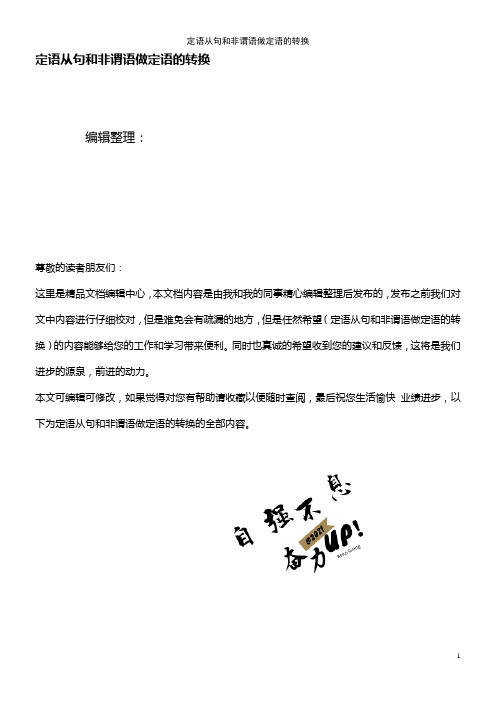
定语从句和非谓语做定语的转换编辑整理:尊敬的读者朋友们:这里是精品文档编辑中心,本文档内容是由我和我的同事精心编辑整理后发布的,发布之前我们对文中内容进行仔细校对,但是难免会有疏漏的地方,但是任然希望(定语从句和非谓语做定语的转换)的内容能够给您的工作和学习带来便利。
同时也真诚的希望收到您的建议和反馈,这将是我们进步的源泉,前进的动力。
本文可编辑可修改,如果觉得对您有帮助请收藏以便随时查阅,最后祝您生活愉快业绩进步,以下为定语从句和非谓语做定语的转换的全部内容。
定语从句和非谓语做定语的转换非谓语做定语是定语从句的简化形式Please replace the underlined part with relative clauses1.The picture hanging on the wall is painted by my nephew。
2.The Olympic Games, held in 776 B。
C., did not include women players until 1912。
3. The first text books written for teaching English as a foreign language came outin the 16th century。
4.Are you going to attend the meeting to be held tomorrow?5. a developed/developing country6. He is a student loved by all the teachers.7.The building being built will be the third Teaching Building of our school.8.She is always the first (one) to come and the last to leave。
【写作指导】状语从句与非谓语动词的转化(写作)
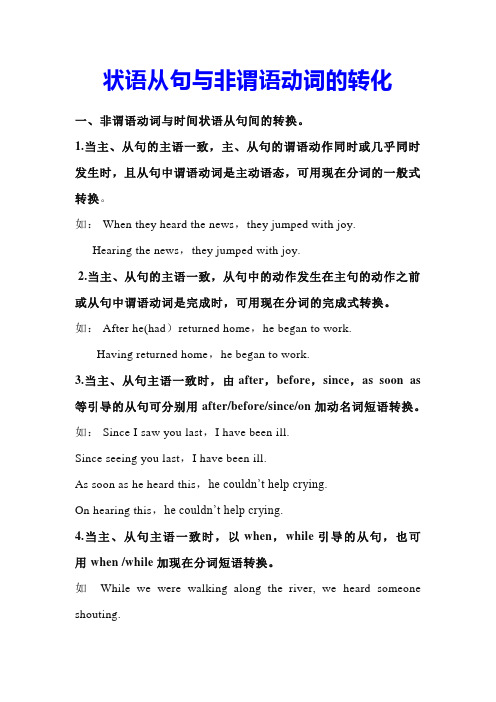
状语从句与非谓语动词的转化一、非谓语动词与时间状语从句间的转换。
1.当主、从句的主语一致,主、从句的谓语动作同时或几乎同时发生时,且从句中谓语动词是主动语态,可用现在分词的一般式转换。
如: When they heard the news,they jumped with joy.Hearing the news,they jumped with joy.2.当主、从句的主语一致,从句中的动作发生在主句的动作之前或从句中谓语动词是完成时,可用现在分词的完成式转换。
如: After he(had)returned home,he began to work.Having returned home,he began to work.3.当主、从句主语一致时,由after,before,since,as soon as 等引导的从句可分别用after/before/since/on加动名词短语转换。
如: Since I saw you last,I have been ill.Since seeing you last,I have been ill.As soon as he heard this,he couldn’t help crying.On hearing this,he couldn’t help crying.4.当主、从句主语一致时,以when,while引导的从句,也可用when /while加现在分词短语转换。
如While we were walking along the river, we heard someone shouting.While walking along the river,we heard some one shouting. 5.当主、从句的主语一致,且从句的谓语动词是被动语态时,可用过去分词短语转换。
如:After they were sent to the zoo, the monkeys had good health.Sent to the zoo, the monkeys had good health.6.当主、从句的主语不一致时,时间状语从句可转换成分词的独立主格结构,即名词/主格代词+分词。
定语从句变为非谓语动词作后置定语的方法

定语从句变为非谓语动词作后置定语的方法这个问题有点大,没有好好研究过,下面是临时凑的几条,不一定全面,仅供参考:▲如果定语从句的谓语是进行时态(包括用进行时态表示将来意义的用法),通常可以转化为现在分词或过去分词短语(括号内的词不省略为定语从句,省略后即为现在分词短语作定语)。
如:Do you know the woman (who is) talking to Tom? 和汤姆说话的女人你认识吗?There were some children (who were) swimming in the river. 有些小孩在河里游泳。
I didn’t talk much to the man (who was) sitting next to me. 我没和坐在我旁边的人多讲话。
Police (who are) investigating the crime are looking for three men. 调查这件罪案的警察在找寻三个人。
但是要注意的是,并非只有谓语是进行时态的定语从句才可转化为现在分词(短语),有时一般时态也可转化为现在分词(括号前的现在分词可以括号内的定语从句来改写)。
如:It is said that those eating (=who eat) the most are the least healthy. 据说吃得最多的人身体最差。
Jim has got a brother working (=who works) in a bank in London. 吉姆有一个哥哥在伦敦的一家银行里工作。
Students wanting (=who want) more information should apply in writing. 想要得到更多资料的学生应提出书面申请。
A young man writing (=who writes) novels came to speak to us yesterday. 一位写小说的青年昨天来向我们作报告。
(优选)非谓语动词与从句的转化简化

3)Educated by the Party, he became =As he was a great fighter(原因). educated
4) Not having =Because I hadn’t
received an answer, I wrote again.(原因).
5) (If)given
=If we had been given
enough time, we could have done it better.
6) (Though)having made great achievement
= Though he had
(让步), he didn’t pride.
followed by the students =and he was followed by the students
=with us following him
=and we followed him
7.be+形容词+介词+ing可与be+形容词+that从 句转换
1)He was afraid of being
his not having =that he hasn’t
3)The question is in the fire.
many people’s being trapped
=that many people are trapped
4.v-ing形式作定语可换成that, who, whic引 导的定语从句
1)Everything protected
(=when everything was prepared)
从句变非谓语动词
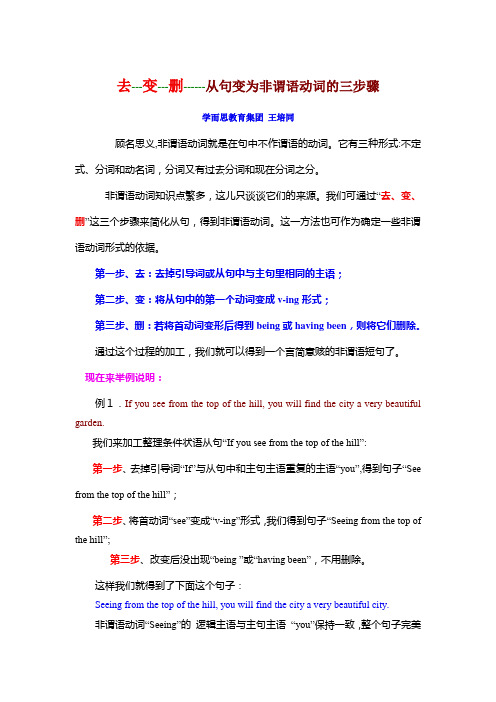
去---变---删------从句变为非谓语动词的三步骤学而思教育集团王培同顾名思义,非谓语动词就是在句中不作谓语的动词。
它有三种形式:不定式、分词和动名词,分词又有过去分词和现在分词之分。
非谓语动词知识点繁多,这儿只谈谈它们的来源。
我们可通过“去、变、删”这三个步骤来简化从句,得到非谓语动词。
这一方法也可作为确定一些非谓语动词形式的依据。
第一步、去:去掉引导词或从句中与主句里相同的主语;第二步、变:将从句中的第一个动词变成v-ing形式;第三步、删:若将首动词变形后得到being或having been,则将它们删除。
通过这个过程的加工,我们就可以得到一个言简意赅的非谓语短句了。
现在来举例说明:例1.If you see from the top of the hill, you will find the city a very beautiful garden.我们来加工整理条件状语从句“If you see from the top of the hill”:第一步、去掉引导词“If”与从句中和主句主语重复的主语“you”,得到句子“See from the top of the hill”;第二步、将首动词“see”变成“v-ing”形式,我们得到句子“Seeing from the top of the hill”;第三步、改变后没出现“being ”或“having been”,不用删除。
这样我们就得到了下面这个句子:Seeing from the top of the hill, you will find the city a very beautiful city.非谓语动词“Seeing”的逻辑主语与主句主语“you”保持一致,整个句子完美无瑕,加工成功!例2.If the city is seen from the top of the hill, the city looks like a beautiful garden.第一步、去掉引导词“If”与从句中和主句主语重复的主语“the city”,我们得到句子“is seen from the top of the hill”;第二步、将首动词“is”变成“v-ing”形式,我们得到句子“being seen f rom the top of the hill”;第三步、改变后出现“being”,删除,剩下句子“Seen from the top of the hill”。
非谓语动词及从句转换

=so as not to lose his job.
非谓语动词和从句的转换
I. v-ing 形式与从句之间的转换
1. v-ing形式作主语可换成that引导的主语从句
2. v-ing形式作宾语或宾补可换成that 引导的宾语从句
I remember having paid him for his work.
I remember that I have paid him for his work. He suggests our making better use of the school library.
We will study in the house facing south.
We will study in the house that / which faces south. The man talking to my teacher is my father.
The man who / that is talking to my teacher is my father.
While waiting at the dentist’s, I read the whole of a short story. (=While I was waiting … ) Before being in the army, he was an engineer.
(= Before he was in the army, …) __H_av_in_g__fi_ni_sh_e_d__(finish) my work, I went to
- 1、下载文档前请自行甄别文档内容的完整性,平台不提供额外的编辑、内容补充、找答案等附加服务。
- 2、"仅部分预览"的文档,不可在线预览部分如存在完整性等问题,可反馈申请退款(可完整预览的文档不适用该条件!)。
- 3、如文档侵犯您的权益,请联系客服反馈,我们会尽快为您处理(人工客服工作时间:9:00-18:30)。
Her being chosen as the chairman of the Students Union, it made us very happy.
1)They started off early in order / so as to
=in order / so that they could arrive in time.
so excited as not to go to sleep. 2)She was
=too excited to go to sleep. =so excited that she couldn't go to sleep.
2)Spring coming
the fields are full of
(=when spring comes) life(时间).
3)The teacher being ill
(=As the teacher was ill),
the lecture was put off(原因).
4)Weather permitting we will go for a spring outing.(条件)
从句和非谓语动词的转化
1.Study hard and you will succeed. =Study hard . You will succeed. =If you study hard, you will succeed. =Studying hard, you will succeed.
8.分词的独立主格结构在句中作状语,表示时间、原因
条件等和相应的时间、原因、条件等状语从句转换;伴随 状语多并列句转换。
1)Everything protected
(=when everything was prepared)
we began to carry
out the project(时 间).
2. v-ed形式作宾补可换成宾语从句
I found the room broken =(that) the room had been broken
into and a lot of things had been stolen.
3.v-ed形式作状语可换成状语从句
1) (If) heated, =If it is heated.
=That the students know in learning French.
2)Her being chosen
made us very happy.
=That she was chosen
His being out of work
made his =That he was out of work parents worried
句
法
陈述句
疑问句 的 2.并列句
主语从句
分
名词性 宾语从句
类
从句
同位语从句 <=>非谓
3.主从复合句 定语从句
语动词
状语从句
非谓语动词与从句间的相互关系及转换:英语中的 非谓语动词是整个英语语法当中非常重要的部分, 也是英语学习的一个难点。非谓语动词作句子成分 时与相应的从句有着千丝万缕的联系,它们之间可 以有条件的进行相互转换。
II. V-ed形式与从句之间的转换
1)The question is very important.
discussed yesterday
=that / which was discussed
2)The boy lost in thought
=who is lost in thought is my brother.
=What I should do 2)I warned him not to drive the car
=I warned that he should not after drinking.
3.to do形式作表语可换成表语从句
1)My wish is to become a pilot after graduation.
复合句
非谓语词
分词短语与从句的转换: 学非谓,讲联系,非动宾,便 主谓;被动关系加ED,主动关 系加ING; 加 ,减 变三字, 规律解难题.
I. v-ing 形式与从句之间的转换
1.v-ing形式作主语可换成that引导的主语从句
1)The students’ knowing English helps them
4.v-ing形式作定语可换成that, who, whic引 导的定语从句
1)We will study in a building built recently.
=which has been built
2)The man talking to
= who is talking to Tom is his young brother.
=while I was waiting
3)Educated by the Party, he became =As he was a great fighter(原因). educated
4) Not having =Because I hadn’t
received an answer, I wrote again.(原因).
2)The trouble is enough money to support his family.
his not having =that he hasn’t
3)The question is in the fire.
many people’s being trapped
=that many people are trapped
(=If weather permits)
5)More time given
(=If more time had been given)
we would have done it
much better.(条件)
6)The boy stood there,
his right hand raised (=and his right hand was raised. (伴随)
Practise
I. 把下列的单句变成恰当的从句,然后变成合适的非谓语形式
1.we see the earth from space. we find it like a blue ball.
If/ When we see the earth from space, we find it like a blue ball
followed by the students =and he was followed by the students
=with us following him
=and we followed him
7.be+形容词+介词+ing可与be+形容词+that从 句转换
1)He was afraid of being
3. She was chosen as the chairman of the Students Union. It made us very happy.
That she was chosen as the chairman of the Students Union made us very happy.
=When and where we will
2)They seemed to be eating
=It seemed that they were eating
something cooked on the fire.
2.to do形式作宾语或宾补可换成宾语从句
1)I don't know what to do with the matter.
water will turn intsteam.
2)Don't speak until
spoken to.
=you are spoken to.
III. to do形式与从句的转换
1. to do形式作主语可转换成主语从句
1)When and where (for us) to
hold the meeting is unknown yet.
3)He lives in a house facing south
=that faces south.
5. v-ing形式作状语可换成相应状语从句
1)On arriving =as soon as I arrive
there ,I will telephone you(时间).
2)(while) waiting for the bus, I caught sight of her(时间).
=that / which will be held
is of great importance.
2) He was the first to arrive and the last to leave.
last that left.
=that arrived and the
5.to do形式作目的、结果、原因状语可转 换成相应的状语从句
6.分词短语在句中作状语可以表示”伴随”,结果, 相当于一个并列句,因此可以和and连接的并列句 转换,也可以和with复合结构转
